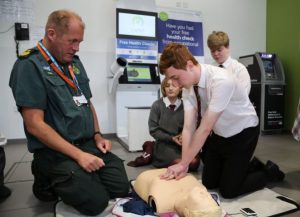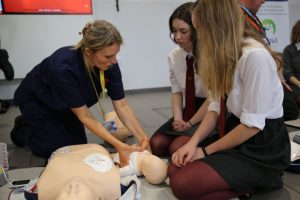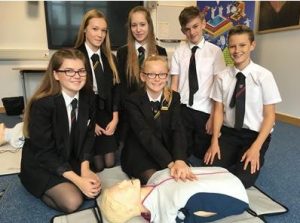This Tuesday coincided with Restart a Heart Day so the training moved to the front entrance of Southampton General Hospital as part of a public engagement event.


This Tuesday coincided with Restart a Heart Day so the training moved to the front entrance of Southampton General Hospital as part of a public engagement event.


LifeLab has welcomed calls for resuscitation training to be added to the school curriculum to help save more lives across the country.
Today marks Restart a Heart Day which draws attention to the importance of learning resuscitation skills.
Each year around 2,000 school children are taught vital lifesaving skills in the past year by participating in the LifeLab programme.

As part of the innovative education programme that teaches young people about the science behind health messages, students also take part in a session on CPR training. During their visit to the state of the art teaching space in Southampton.
Supported by Wessex heartbeat and the British Heart Foundation the sessions involve students being taught basic lifesaving skills by resuscitation officers from University Hospital Southampton Foundation Trust – where LifeLab is based.
Dawn Hargraves, a resuscitation officer at University Hospital Southampton NHS Foundation Trust, said cardiopulmonary resuscitation (CPR) “should be viewed as a life skill” which is “embedded from the outset”.
She said: “Unfortunately, as a nation, we have never put enough emphasis on the importance of CPR,” she said, speaking on behalf of the resuscitation services department. “It should be viewed as a life skill as it could be required at any time and in any situation, not just in hospitals.
“That is a feeling shared by clinicians in resuscitation services, emergency departments, intensive care units and across all emergency services as we all see the devastating results of CPR not being started by a bystander – it is a topic we all feel very passionate about.”
As part of the Restart a Heart initiative, students who are visiting LifeLab today (TUES) will be involved in a public demonstration of resuscitation training in the front entrance of Southampton General Hospital.
Since it began, almost 9,000 students have taken part in the LifeLab programme, which is supported by the University of Southampton’s medicine and education schools with the teaching space at the National Institute for Health Research Biomedical Research Centre at University Hospital Southampton.
To read the full press release click here.
©2024 University of Southampton